For the 2025 school year, there is 1 public high school serving 63 students in Agra School District.
Public High School in Agra School District have an average math proficiency score of 50% (versus the Oklahoma public high school average of 21%), and reading proficiency score of 50% (versus the 38% statewide average).
Public High School in Agra School District have a Graduation Rate of 80%, which is more than the Oklahoma average of 79%.
The school with highest graduation rate is Agra High School, with ≥80% graduation rate. Read more about public school graduation rate statistics in Oklahoma or national school graduation rate statistics.
Minority enrollment is 27% of the student body (majority Hispanic), which is less than the Oklahoma public high school average of 55% (majority Hispanic and American Indian).
Overview
This School District
This State (OK)
# Schools
3 Schools
490 Schools
# Students
289 Students
216,889 Students
# Teachers
17 Teachers
12,380 Teachers
Student : Teacher Ratio
17:1
17:1
District Rank
Agra School District, which is ranked within the bottom 50% of all 533 school districts in Oklahoma (based off of combined math and reading proficiency testing data) for the 2021-2022 school year.
The school district's graduation rate of 80% has decreased from 80-89% over five school years.
Overall District Rank
#400 out of 538 school districts
(Bottom 50%)
(Bottom 50%)
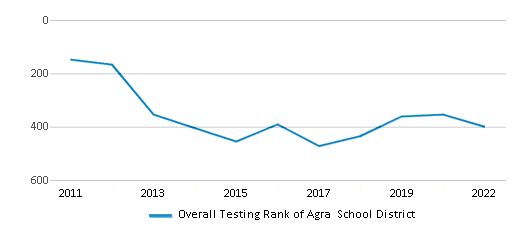
Math Test Scores (% Proficient)
15-19%
25%
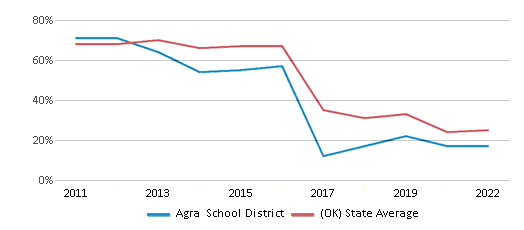
Reading/Language Arts Test Scores (% Proficient)
15-19%
27%
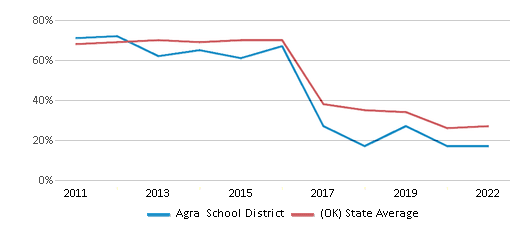
Science Test Scores (% Proficient)
11-19%
31%
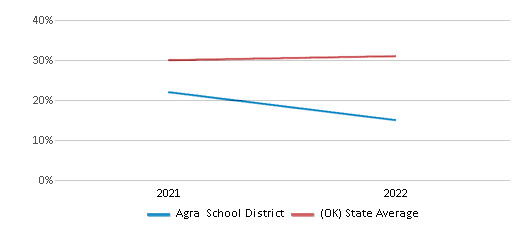
Graduation Rate
(20-21)≥80%
78%
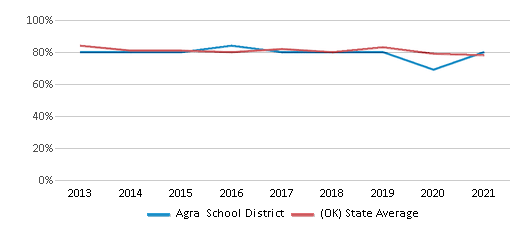
Students by Ethnicity:
Diversity Score
0.46
0.72
# American Indian Students
20 Students
24,223 Students
% American Indian Students
7%
11%
# Asian Students
n/a
4,713 Students
% Asian Students
n/a
2%
# Hispanic Students
13 Students
43,814 Students
% Hispanic Students
5%
20%
# Black Students
4 Students
17,404 Students
% Black Students
1%
8%
# White Students
206 Students
98,627 Students
% White Students
71%
46%
# Hawaiian Students
n/a
866 Students
% Hawaiian Students
n/a
n/a
# Two or more races Students
46 Students
27,185 Students
% of Two or more races Students
16%
13%
Students by Grade:
# Students in PK Grade:
25
-
# Students in K Grade:
26
-
# Students in 1st Grade:
25
-
# Students in 2nd Grade:
21
-
# Students in 3rd Grade:
26
-
# Students in 4th Grade:
24
11
# Students in 5th Grade:
16
19
# Students in 6th Grade:
27
36
# Students in 7th Grade:
21
867
# Students in 8th Grade:
15
1,952
# Students in 9th Grade:
20
57,588
# Students in 10th Grade:
18
55,440
# Students in 11th Grade:
13
52,900
# Students in 12th Grade:
12
48,076
# Ungraded Students:
-
-
District Revenue and Spending
The revenue/student of $13,495 is higher than the state median of $10,983. The school district revenue/student has grown by 11% over four school years.
The school district's spending/student of $11,159 is higher than the state median of $10,957. The school district spending/student has grown by 11% over four school years.
Total Revenue
$4 MM
$7,919 MM
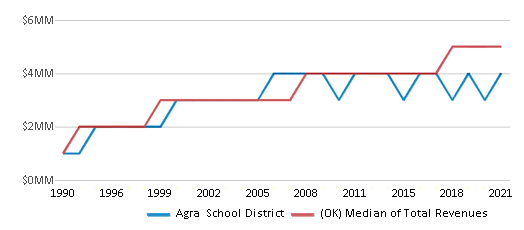
Spending
$3 MM
$7,900 MM
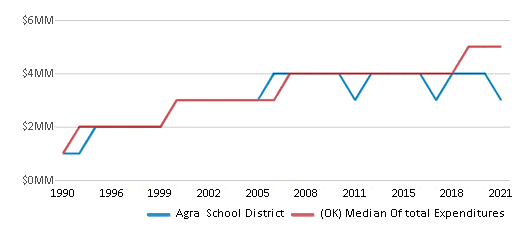
Revenue / Student
$13,495
$10,983
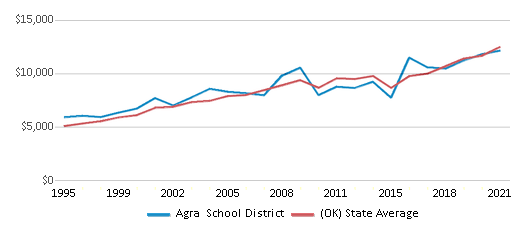
Spending / Student
$11,159
$10,957
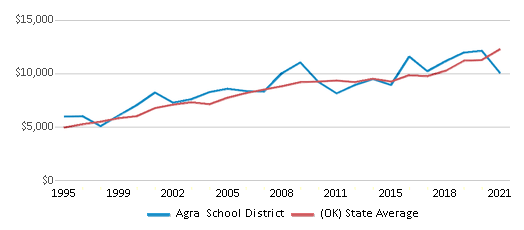
Best Agra School District Public High Schools (2025)
School
(Math and Reading Proficiency)
(Math and Reading Proficiency)
Location
Grades
Students
Rank: #11.
Agra High School
(Math: <50% | Reading: <50%)
Rank:
Rank:
10/
Top 5%10
516 Lincoln
Agra, OK 74824
(918) 375-2261
Agra, OK 74824
(918) 375-2261
Grades: 9-12
| 63 students
Recent Articles

Sexual Harassment at Age 6: The Tale of a First Grade Suspension
A six-year old in Aurora, Colorado, was suspended after singing an LMFAO song to a little girl in his class and reportedly “shaking his booty.” We look at the case and the sexual harassment problem in public schools today.

How Scaffolding Could Change the Way Your Child Learns
This article explores the concept of instructional scaffolding, a teaching method that enhances learning by breaking down complex tasks into manageable parts. It highlights how scaffolding supports students in developing critical thinking skills and becoming more independent learners. The article discusses the benefits of scaffolding, including improved engagement and reduced anxiety, and provides strategies for its implementation across various educational levels.

February 05, 2025
Understanding the U.S. Department of Education: Structure, Impact, and EvolutionWe explore how the Department of Education shapes American education, from its cabinet-level leadership to its impact on millions of students, written for general audiences seeking clarity on this vital institution.





